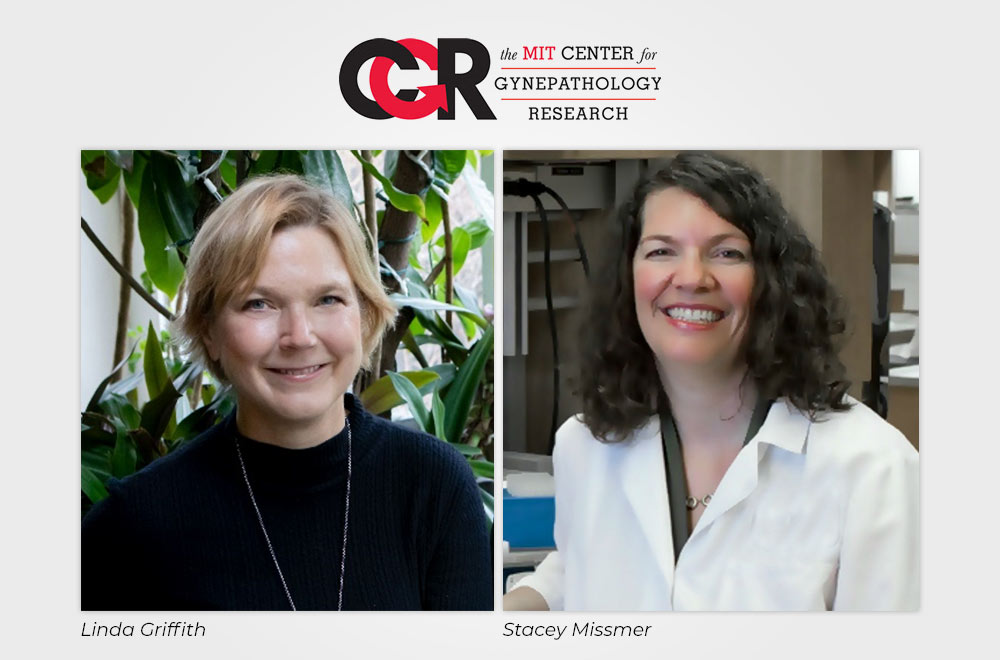Please join us on Sunday, July 11, 2021, from 4 to 5 p.m. (ET), as we kick off the virtual series, “The Science of Endometriosis.” MIT’s Linda Griffith and Michigan State University’s Stacey Missmer will lead a lively discussion titled Endometriosis 101 – Clinical Studies. They’ll answer questions including, What is a clinical study and how does it differ from a clinical trial? How is a clinical study planned, funded, and carried out? How can patients contribute to a clinical study or trial? Answers to these all inform a question on everyone’s mind – Why aren’t there more studies, and why don’t we know more about endometriosis? They’ll also answer selected questions sent by registered attendees and give a virtual tour of a clinical study.
Once you register, you can submit questions for the panelists here.
About The Science of Endometriosis
Hosted by scientists, clinicians, and other experts, The Science of Endometriosis is a virtual series that brings together patients, families, researchers, healthcare providers, communities, business leaders, and academic leaders to examine the health impact of endometriosis and discuss bold ideas and actions to achieve better diagnoses and treatments for this common life impacting disease. Visit the CGR website for resources on these topics and to learn more about recent and future events.
Linda Griffith (BS Georgia Tech, PhD UC Berkeley, Chemical Engineering) is MIT’s School of Engineering Teaching Innovation Professor of Biological and Mechanical Engineering and MacVicar Fellow, where she co-founded and directs the Center for Gynepathology Research. Griffith has endometriosis and has had multiple surgeries for it. She and her colleagues are doing groundbreaking research into this disease.
Griffith led the development of MIT’s Biological Engineering SB degree program, which was approved in 2005 as the university’s first new undergraduate major in 39 years. She has pioneered approaches in tissue engineering and recently led one of two major DARPA-supported “body-on-a-chip” programs, resulting in the first platform to culture 10 different human mini-organ systems interacting continuously for a month.
Griffith leads the field of “Physiomimetics,” integrating these platform technologies with systems biology and systems immunology to humanize drug development for the most challenging chronic inflammatory diseases, including endometriosis and adenomyosis, through collaboration with industry partners in Pharma and Biotech around the world. She has over 200 peer-reviewed scientific publications and holds over a dozen patents and is a member of the National Academy of Engineering, the recipient of a MacArthur Foundation Fellowship, Radcliffe Fellowship, the National Academy of Engineering’s 2021 Bernard M. Gordon Prize for Innovation in Engineering and Technology Education, and several awards from professional societies.
Stacey Missmer (BA Lehigh University, Master (M.Sc.) and Doctor of Science (Sc.D.) Harvard University, Epidemiology) is a Professor of Obstetrics, Gynecology, and Reproductive Biology at Michigan State University; Adjunct Professor in Epidemiology at Harvard TH Chan School of Public Health; and Lecturer in Pediatrics at Harvard Medical School.
As a teen and young woman, Dr. Missmer struggled with chronic pelvic pain. Her journey as an endometriosis-focused scientist began with her doctoral dissertation in 1998 within the Nurses’ Health Study research group at Channing Laboratory. Author of 300 peer-reviewed scientific publications, much of her research has focused on identifying factors that affect the risk for and consequences of endometriosis. In 2012, Dr. Missmer co-founded the Boston Center for Endometriosis and serves as the Scientific Director. That same year she launched, with co-PI Dr. Krina Zondervan, the World Endometriosis Research Foundation Endometriosis Phenome and Biobanking Harmonization Project (WERF EPHect), which provides standardized tools for endometriosis-focused data and biologic sample collection.
Dr. Missmer is President-Elect of the World Endometriosis Society, Immediate Past Chair of the American Society for Reproductive Medicine Endometriosis Special Interest Group, and a WERF Trustee.








